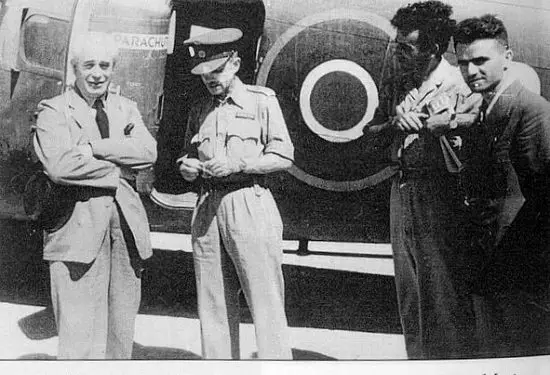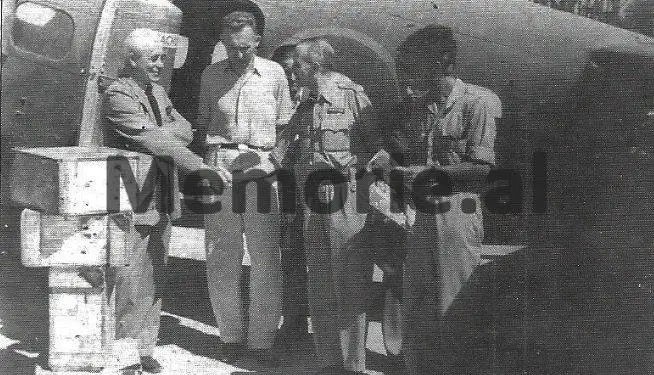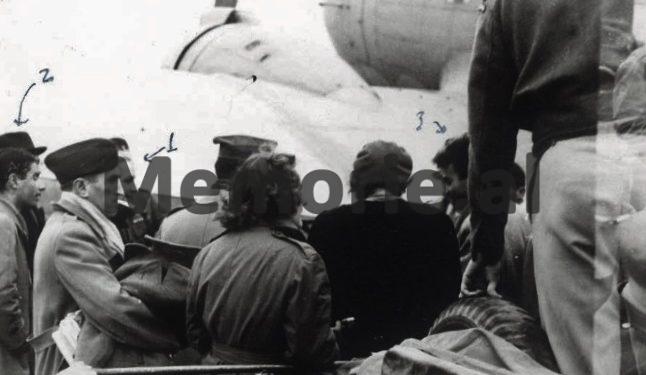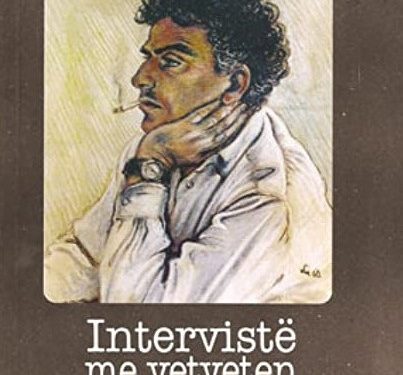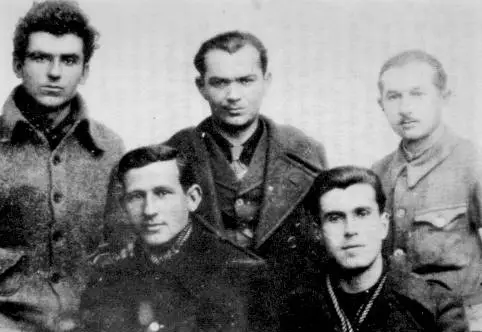Memorie.al / Confessions of the writer Petro Marko, former fighter of the Internationalist Brigades in the War of Spain and Tirana, tells the backstage of the War and why Koçi Xoxe hated Enver?! Sejfulla Maleshova’s order: “This is a terrorist party, don’t open your mouth, because you will suffer…”! Selected parts from the book “Interview with myself”, by the well-known Albanian writer Petro Marko.
“Self-Interview”
The author Petro Marko appears during the narration of his story in “Self-Interview” as a mythological creature, born to hold the sword raised and ready to strike evil wherever it is, convinced that this is how he cleanses the sky native land. With this great faith, Petro Marko, after years of continuous battles in Europe, in 1944, will return to Albania. At the age of 30, but with so many achievements on his back, that in the life of an ordinary man they cannot be loaded even for a century, Petro Marko, as long as he was alive, will experience the greatest disappointment and pain in his homeland.
The first days in Tirana, after appointing him as press officer, they assigned him the house where he would live. Late in the evening, on the first night, he will witness a sad meeting with the family and the owner of the villa: “Comrade Petro, they have given us an order to release the house to you with everything in it, where will we settle and can let’s take something personal with us”, the lady of the house waits for him, trembling. Petroja gets sad, leaves the house and asks for clarification from her friends – isn’t it a mistake or a misunderstanding?
This is how he begins his narrative in the voluminous work “Interview with himself”, which is one of the most chilling testimonies about what would come and grip Albania during the Communist dictatorship. They will also force Petro Marko to come under the tutelage of the “Borba” newspaper in Belgrade. But he does not accept: “We have more tradition, we are the successors of the newspaper “Bashkimi i Kombit” before the war, let “Borba “learn from us” and this is where the new ordeal of imprisonments and persecutions of a savage will begin had not tried it before.
A fellow soldier from Italy, after nearly 50 years, sometime before his death, will say to Petros: “Write your way, your story because it is worth more than 100 novels”. And indeed, the book “Interview with me” is the history of Albania for half a century. The drama of the nation is better known through this work.
Behind the scenes of the War, this is why Koçi Xoxe hated Enver…!
Petro Marko was born in November 1915, in the village of Dhërmi and passed away in December 1991. His father’s name was Marko, and his mother’s name was Zoica. Since he was a student of the Commercial School in Vlora, which he started in 1924 and finished in 1932, he started writing poetry and
short prose. In that school, the teacher and researcher, Kolë Kamsi, was the director and Ernest Koliqin was the teacher…!
…But more than in any work, the philosophy of living of Petro Markos is especially felt in the monumental book “Self-Interview”, left a manuscript and published 10 years after the author’s death. In this work, Petro Marko leaves his life path, his biography as direct evidence, without distancing himself, through literary characters, as he does in most novels.
The narration is strict and total; it rises to the level of a metaphor for Albania’s path during 60 years, a metaphor for the continuous human struggle between good and evil. Fighter and chief fighter in Spain, France and Italy, prison insurgent across Europe and the Mediterranean, Petro Marco marches strongly towards his homeland, which was occupied by fascism. Here are some excerpts from this book:
Question: Why did you stop this interview with yourself 14 years ago and resume it now, in July 1991?
Answer: It was impossible to write, because, even to think about it, it was life-threatening…!
I remember the thirties: I had gone to Korça to do a survey for the “Vatra” newspaper, where I worked. I had met Viti Shahini (Afërdita), a very good friend who studied in France, where she met Halim Xhelon, who gave her materials for me. (She later married my dear friend, Zef Mala, a very cultured man, founder of the Communist Group of Shkodra, since 1937) I also knew her brother, Ilo Shahini, whom I taught to sing “International”. Elder Vangjel, Viti’s and Ilo’s father, asked what this song was. We explained it to him and he immediately shouted: “Aman, don’t teach him, that when you go to Tirana, at the hotel, you can sing it in your sleep and then the river will take us! That’s what fear had entered our hearts.
Now you will understand me and you will justify why I did not write my memoirs in the meantime, from the time I landed in Himare – October 1944 – with about 200 volunteers who came from prisons and exiles: because it could be done to me again a surprise search and to be found, as happened to me in 1947 and later to my son, who was arrested in 1975. I would endanger myself and my whole family. And now I’m going back to where I left off.
I cannot describe the moment when the steamers approached the coast of Spile i Himara. I saw many people waiting for us. Among them a crowd of skeletons, covered from head to toe with rags, cried out in Italian: “portateci in Italia, vi pasantlo”! And jumped into the sea, but a burst of machine gun scared them and I heard a voice shouting: “Or go back, or I killed you”. It was Minella Koleka’s voice. I was shocked and went out first, threw myself on his neck, hugged him and said: Why don’t you let these poor Italians go back to Italy?
Until now, – he told me, – we have repatriated thousands and thousands of Italian soldiers, who kept Albanian families to save them from the Germans. The Italian general Azzo Azzi used to come here and load them with steamers. Now we have received orders to collect them and then we, our government, send them to Italy.
Question: Who was Minella Koleka?
Answer: He was one of the best friends of that time. Patriot and revolutionary, friend of Halim Xhelos and Omer Nishan, had been imprisoned and we had been together in Trana prison. Then they imprisoned him in Vlora prison and from there he escaped and went underground. With the brave Zaho Koka, they founded the old gang of Tirana. He was more important, therefore, when the South was liberated, in Himare, they appointed Minella as the chairman of the Committee. Imagine how longingly we talked with eyes wet with tears: he told me about the War, about the killed comrades: I told him about the suffering in prisons and on the islands of Italy. Minella laid a big lunch for the crew of the two steamers that brought us, and they raised a toast to the friendship of the peoples of the anti-fascist coalition. For those of us who returned alive to Albania that was being liberated, the great dream was coming true
Question: What about next?
Answer: Our goal was to reach Berat, where our democratic government was. And we left loaded with weapons and chests. We arrived in Dhërmi, where we were greeted with great warmth. I hurried through the stones, between the olive trees, uphill towards my house. I missed not only my sister and brothers, all my relatives and fellow villagers, but also the stones and trees.
After we met with tears and great longing, that I came back alive again, the house began to fill with people. The whole village came. The old people mourned my death, kissed me and recounted my sufferings and those of my family. My return was a joy, a joy bathed in tears, after we ate a morsel of bread, the villagers took all the newcomers and scattered them among their houses.
When I was left alone with Lilo (whose real name was Vasiliqi), she didn’t let me talk about my suffering, because her lip trembled, because she loved me so much, but she started telling me what she had done for the war. He had waited in the big, poor house full of partisans, to whom he put the kettle with warm water and soap, so that they could wash and clean their clothes from lice. Among them was Xhevo Shehu, the wife of the “People’s Hero”, Abaz Shehu. She told me these things, to give me a satisfaction, that she also, as much as she could, did something for the war.
He told me that, when he helped the partisans, he remembered me and did it for me, that he thought of me more dead than alive. In the meantime, Andoni’s children had grown up, while the younger brother, Agjisilla, who had married a beautiful and good bride, also had younger children. On the other side of the house, at my uncle Andrea Marko’s, who was killed in a fight, his son, Jani Marko, even though he had been the head of the village at the time of the Germans, had helped the partisans a lot.
In May 1944, someone ambushed Jan, who left his wife with a daughter and 6 orphaned sons. When we parted, he assured me that he would be by my side. His murder remained a mystery that was never solved. All seven of his children remained in poverty and the death of their father followed them all their lives like a shadow. They remained persecuted.
We left for Berat. We walked loaded and happy, because we were on our land. At night we reached Dukat. I asked Koço Kaporen, who I had mine, and he, as the head of the council, divided the friends into families. We were told in Himare to be careful in Dukat, because there were still ballistic missiles there. At Koço Kopore’s house came Dukat’s pariah, some of whom I knew. We talked a lot and they were cursing the time when I was arrested, that they would not have been lied to by some ballistic leaders who said that we were allegedly with the Americans. The brave Malik Koshena also came and told me: “I won’t give him my hand, brother Petro, because I have him…!
What do you want, you left and we were wrong, because they lied to us…! The Duchy has not been betrayed. I’ll tell you an episode: the partisans were left in the Llogara Pass, because the Germans were there in the istikam. I went with my squad and with knives we threw ourselves at the German istikams, destroyed them and told the partisans: pass now, because we destroyed the Germans!” Malik Koshena and the other patriots did not know the reasons why people like Skënder Muçoja, as a friend of Mit’hat Frashër and a friend of the Americans, were against the Party: they knew that the Party was created by the Yugoslavs, with the help of Dušan and Miladin Popović. We understood this later…!
From Dukati we went to Vlora, where I met my old friends, who were overjoyed when they saw me. We boasted that the first tract against the occupier was printed in Vlora, in the house of Ibrahim Shyti, who was imprisoned with his whole family (one of his sons was killed in Pristina). The family of the patriot Ibrahim Shyti, is the first family that was persecuted and destroyed by the occupier, as I have shown in the first part.
Question: When did you arrive in Berat?
Answer: We arrived in Berat at the end of October, walking most of the time, loaded. The first thing I had to do was report to headquarters. When I entered the office, I saw Koçi Xoxen, with whom we hugged with tears in our eyes, because when they took me bound for Italy, I left Koçi in Tirana prison. He used to teach me with a spoon, that I was more paratyphoic. Koçi was dressed in kilotas and an alpine jacket. He told me: Here, this is comrade Enver Hoxha, the secretary of the Party and the chairman of the democratic government. Enveri shook my hand very politely and said: – We have the Party convoy in Kochi. He is the organizational secretary of the Party.
I had made some characteristics of some of those 200 people who came with us from Italy. They were taken by Teodor Heba, who was the secretary there. All of them were distributed in beratase families; I was assigned to Sallabanda’s house, near Margarita Tutulan’s house, in Gorica. When I left the government offices, which were in the Vrionas palaces, Koçi came out with me and we were talking on the way.
He said to me: “We have nothing to do, Petro! Some vagabonds and scoundrels have been smuggled into the Party.” I asked him how it was possible and who they were. “Here, for example, is the one you saw, Enver Hoxha, a suspicious man, rather from the political side, who was not a communist before. How he managed to be in charge of these affairs, God only knows!” I told him that I didn’t know him, but I had heard about him in France, and that the issue of these types of people in the party should be looked into.
I went to the offices where Sejfulla Malëshova was. He was very happy to see me; the one in Grenobel, I had left it in my room, a room that in the winter the window had to be opened to let in the winter air, because in that city it was alpine cold, it was colder inside than outside. Sejfullai took my arm and we walked to the bridge below the city. I spoke to him very shocked about what Koçi told me about Enver.
He looked me in the eye and said: “Listen well! You have been active in the Spanish party, in the French party, in the Italian party…! This party here is not like them. This is a party created by two Serbs and it is party of terrorists. So listen to me carefully: you must not open your mouth for at least a year about what you see and hear. Otherwise you will suffer…”!
On November 17, the batteries exploded: the news came that Mehmet Shehu with the First Brigade and several others had liberated Tirana. Unprecedented joy. Unbridled enthusiasm. Tirana was liberated. Albania was liberated.
Question: And you didn’t know anything about what was going on behind the scenes?
Answer: I was saved by Sejfullai, because Koçi was still continuing the attack against Enver. He told me that Miladini advised him many times, so that such problems would not arise, that the right time had not yet come. We left for Tirana.
Question: How did you get started?
Answer: Groups – groups. When we arrived in Tirana, we stayed at the “Dajti” Hotel.
We ate and slept at Hotel “Dajti”. I was in a room with Petro Kita. I looked for Mehmet and found him in the headquarters, a soldier was shaving him. We hugged longingly and he said to me in Spanish: “La Republica a trionfalo. Viva la Republica Demokratica Albanes”! The next day, November 28, 1944, the winners would parade. A tribune was erected in front of the “Dajt” hotel.
I also got on the stand, in the left corner, where they would come to parade the winners. A voice somewhere below the stands caught my attention. I looked up and what did I see?! A fellow villager of mine stood guard with a gun in his hand, in the corner of the stand. He was dressed as a partisan and waved his rifle as a sign of victory.
But who was this? A chief corsair. I left him in Tirana prison in March 1942, when I was sent to Italy. He was very sick in prison and I took care of him as much as I could there, together with a group of friends. I was surprised: “After being a partisan and guarding the leadership of the government under the tribune”!
– The grand parade began, all of Tirana turned up to see who was Enver Hoxha, the head of the Government, because they had never heard his name. At that time, Mehmet Shehu was known as a famous fighter for the liberation of the homeland.
“Where did this Enver Hoxha come from, who is he?” – asked the crowds drunk with joy that they were finally freed from the occupiers and traitors. It was a parade that will be etched in memory as long as life lasts: partisan girls and boys paraded with our flag at the top, torn, barefoot, unshaven, but with his head up and weapons on his shoulder. Victory shone on his forehead. People cheered for joy and couldn’t hold back tears from longing…! Memorie.al
The next issue follows




